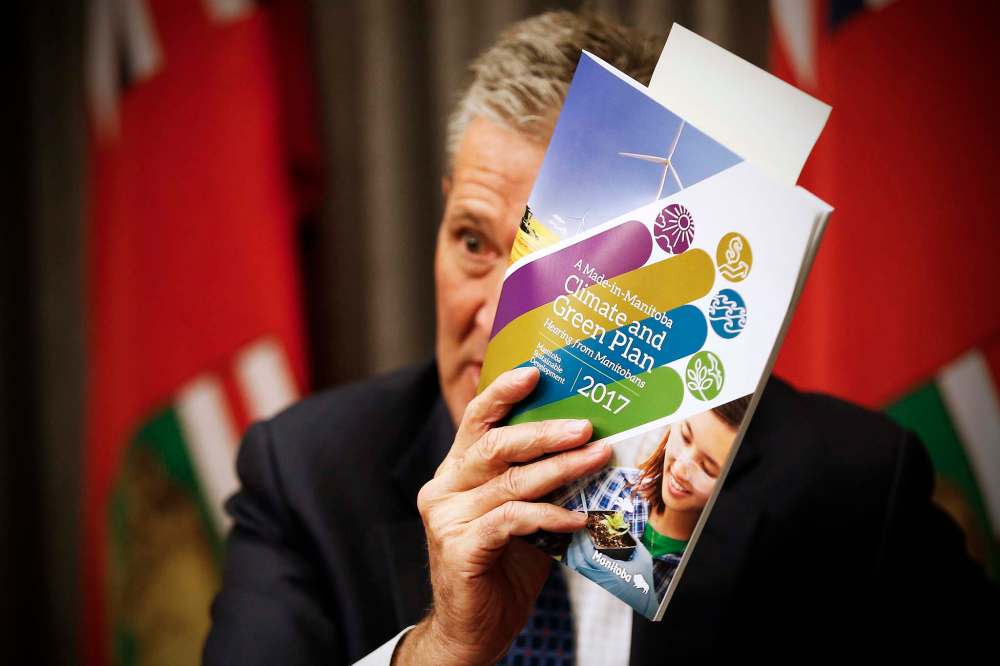Pallister pledges $150M for new green initiatives
PC government aims to get control over carbon tax revenue
Advertisement
Read this article for free:
or
Already have an account? Log in here »
To continue reading, please subscribe:
Monthly Digital Subscription
$0 for the first 4 weeks*
- Enjoy unlimited reading on winnipegfreepress.com
- Read the E-Edition, our digital replica newspaper
- Access News Break, our award-winning app
- Play interactive puzzles
*No charge for 4 weeks then price increases to the regular rate of $19.00 plus GST every four weeks. Offer available to new and qualified returning subscribers only. Cancel any time.
Monthly Digital Subscription
$4.75/week*
- Enjoy unlimited reading on winnipegfreepress.com
- Read the E-Edition, our digital replica newspaper
- Access News Break, our award-winning app
- Play interactive puzzles
*Billed as $19 plus GST every four weeks. Cancel any time.
To continue reading, please subscribe:
Add Free Press access to your Brandon Sun subscription for only an additional
$1 for the first 4 weeks*
*Your next subscription payment will increase by $1.00 and you will be charged $16.99 plus GST for four weeks. After four weeks, your payment will increase to $23.99 plus GST every four weeks.
Read unlimited articles for free today:
or
Already have an account? Log in here »
Hey there, time traveller!
This article was published 19/02/2020 (2124 days ago), so information in it may no longer be current.
Brian Pallister announced more than $150 million in new green initiatives Wednesday as he stepped up his bid to regain control over carbon tax revenues from Ottawa.
However, the premier wouldn’t indicate what price his Progressive Conservative government would be willing to place on carbon, which is a key sticking point between the two levels of government. He said he would not negotiate through the media.
Included among the planned environmental initiatives are $103 million for the cleanup and monitoring of abandoned mines, an additional $50 million for wetlands preservation, nearly $8 million to clean up contaminated sites (including old gas stations), and a $3-million fund for lead mitigation.

“We’ve listened to Ottawa’s entreaties about upping our game, and we have,” Pallister told a news conference.
The PC government had proposed a flat $25 a tonne tax on carbon in response to Ottawa’s demands for a nationwide price on pollution. But Pallister abandoned that proposal over a year ago after failing to receive federal assurances Manitoba wouldn’t be required to increase the tax in the future.
Ottawa imposed its own tax on Manitoba and other provinces without a carbon tax last year. The initial levy was $20 a tonne (equivalent to 4.4 cents a litre on the price of gasoline). It’s set to rise to $30 a tonne this year, and up to $50 a tonne by 2022.
Pallister wouldn’t say Wednesday whether he’d be prepared to institute a carbon tax above his original proposal of $25. He said he still believes the tax should be flat.
“We’re trying to get agreement from the federal government that they’re not going to dip into Manitobans to an increasing degree each year with a higher, escalating carbon tax,” he said.
Pallister revealed his willingness to reopen talks with Ottawa over the carbon tax following a brief meeting with Prime Minister Justin Trudeau in Winnipeg last month.
Manitoba has argued that Ottawa has undervalued its investments in hydroelectric power and a host of environmental initiatives.
The premier hinted the government would announce more green initiatives in its spring budget. A budget date has not yet been announced.
Pallister said federal acceptance of Manitoba’s green plan would be positive for the economy and the environment and “in the best interests of the unity of the country.”
When it was pointed out that several of his new initiatives don’t directly relate to reducing greenhouse gas emissions, the premier responded: “Surely, we shouldn’t just be so focused on, specifically, the issues of carbon that we ignore things like… contaminated mines that are polluting our province.”
NDP environment and climate change critic Lisa Naylor said she was concerned the premier has set no timeframe for his proposed environmental investments.
“He hasn’t announced anything concrete. He isn’t putting any investment towards things that we could be doing right now, today,” she said.
“There are so many environmental groups in this province who are working so hard with wonderful suggestions for changes that could happen here and now, and this government isn’t willing to act on any of them.”
A federal response to Pallister’s comments was not available before deadline.
larry.kusch@freepress.mb.ca

Our newsroom depends on a growing audience of readers to power our journalism. If you are not a paid reader, please consider becoming a subscriber.
Our newsroom depends on its audience of readers to power our journalism. Thank you for your support.



